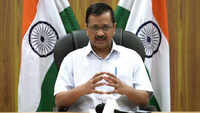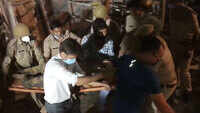
Gurgaon: The Haryana government is planning to scrap a 45-year-old law to put an end to illegal registry of properties in the urban areas, deputy chief minister Dushyant Chautala has said. “Other sweeping changes, including digitisation of land records and unique IDs for properties, are also underway in the state.”
According to Chautala, the government may soon bring in an ordinance to do away with Section 7A of the Haryana Development and Regulation of Urban Areas Act, 1975, which has often been misused to execute illegal registries of agricultural land in urban areas.
As per the provisions of the section, an NOC from the department of town and country planning (DTCP) is not required for registration of agricultural land measuring over 2 kanals (1,011 square yard) in “controlled areas”.
Taking undue advantage of the loophole in the law, people would often pool in money to buy agricultural land over 2 kanals and get them registered in connivance with “corrupt” officials in local tehsil offices to develop illegal colonies.
“I have spoken to the CM on this. If the law is scrapped, it would help end this corrupt practice in the land registration process,” Chautala said.
The deputy CM also said that as per rules, multiple NOCs are required for registration of properties in urban areas, and the respective town and country planning department or the urban local body is required to carry out inspection of every registry executed in their jurisdiction within seven days. But this is hardly done.”
Moreover, for execution of registry, one also needs NOCs from the power department and the urban local body to ensure that electricity and property tax dues, respectively, are not pending. “But these norms are hardly adhered to. To fix these loopholes, we have stopped the registration process for a few weeks,” Chautala said.
The government has also started the process of digitising land records and giving a unique identity to each property. “The digitalisation has been completed in 132 blocks of the state. We are expediting it in the remaining 11 blocks. The details will be linked with the online registry software,” Chautala said.
“The state has 32 urban local bodies, wherein every property will be given unique IDs, and work is near completion in Gurgaon. We will synchronise the digital revenue records and unique ID of properties with the registry software, so that property tax payment, NOCs, etc can be digitally monitored,” he added.
According to Chautala, the government may soon bring in an ordinance to do away with Section 7A of the Haryana Development and Regulation of Urban Areas Act, 1975, which has often been misused to execute illegal registries of agricultural land in urban areas.
As per the provisions of the section, an NOC from the department of town and country planning (DTCP) is not required for registration of agricultural land measuring over 2 kanals (1,011 square yard) in “controlled areas”.
Taking undue advantage of the loophole in the law, people would often pool in money to buy agricultural land over 2 kanals and get them registered in connivance with “corrupt” officials in local tehsil offices to develop illegal colonies.
“I have spoken to the CM on this. If the law is scrapped, it would help end this corrupt practice in the land registration process,” Chautala said.
The deputy CM also said that as per rules, multiple NOCs are required for registration of properties in urban areas, and the respective town and country planning department or the urban local body is required to carry out inspection of every registry executed in their jurisdiction within seven days. But this is hardly done.”
Moreover, for execution of registry, one also needs NOCs from the power department and the urban local body to ensure that electricity and property tax dues, respectively, are not pending. “But these norms are hardly adhered to. To fix these loopholes, we have stopped the registration process for a few weeks,” Chautala said.
The government has also started the process of digitising land records and giving a unique identity to each property. “The digitalisation has been completed in 132 blocks of the state. We are expediting it in the remaining 11 blocks. The details will be linked with the online registry software,” Chautala said.
“The state has 32 urban local bodies, wherein every property will be given unique IDs, and work is near completion in Gurgaon. We will synchronise the digital revenue records and unique ID of properties with the registry software, so that property tax payment, NOCs, etc can be digitally monitored,” he added.
Quick Links
Kerala Coronavirus Helpline NumberHaryana Coronavirus Helpline NumberUP Coronavirus Helpline NumberBareilly NewsBhopal NewsCoronavirus in DelhiCoronavirus in HyderabadCoronavirus in IndiaCoronavirus symptomsCoronavirusRajasthan Coronavirus Helpline NumberAditya ThackerayShiv SenaFire in MumbaiAP Coronavirus Helpline NumberArvind KejriwalJammu Kashmir Coronavirus Helpline NumberSrinagar encounter
Get the app








